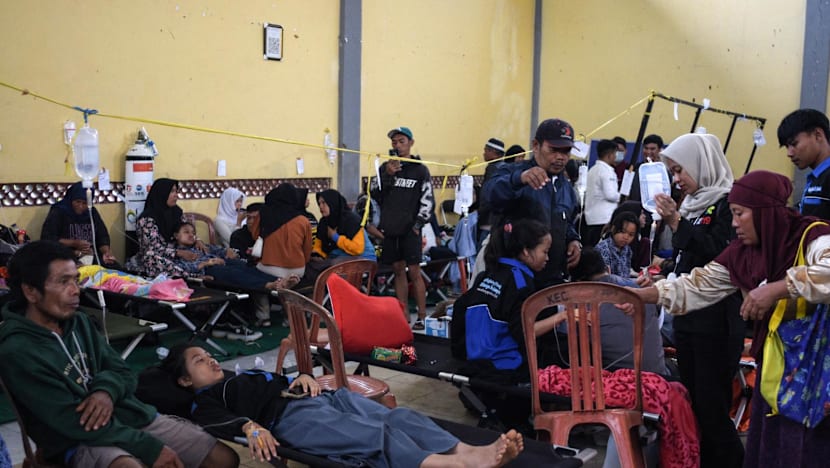World
Indonesia’s Free Meals Initiative Faces Backlash After Poisoning Cases

Indonesia’s ambitious free meals initiative is under scrutiny following reports of nearly 6,000 food poisoning cases since its launch in January 2023. The program, spearheaded by President Prabowo Subianto, aims to provide nutritious meals to approximately 82.9 million beneficiaries, yet concerns over food safety, budget constraints, and logistical challenges have emerged as significant obstacles.
As the program strives to improve children’s nutrition across the nation, it has already reached nearly 30 million recipients. However, the recent surge in food poisoning incidents has led to increased anxiety among parents and caregivers. In West Bandung regency, over 1,000 students fell ill due to foodborne illnesses last week, prompting some families to question the safety of school lunches.
“I was shocked when my children got sick,” said Neng Muna, a mother whose child fell ill. “I will no longer allow them to eat the free meals at school if the program continues.” Instead, she plans to prepare lunchboxes for her children, a sentiment echoed by many in the community.
A 14-year-old student from West Bandung, identified as Via, experienced severe symptoms including vomiting and stomach pain after consuming a school meal. Her grandmother, Euis Nurhayati, noted that the program had initially eased their financial burden but expressed deep concern over the recent health risks, stating, “If this is what happens, we are afraid… they should not continue the program.”
The influx of food poisoning cases has overwhelmed local healthcare facilities. Patients received treatment in shifts at temporary command posts, while others were sent to hospitals, where hallways filled with stretchers accommodated the large number of victims. Ambulance drivers reported exhaustion from the numerous trips to transport affected individuals.
Calls for Re-evaluation and Safety Measures
In light of these troubling developments, medical professionals are urging a re-evaluation of the free meals initiative. Neng Siti Djulaeha, director of Ciliin General Hospital, emphasized the need for expert involvement in meal production and preparation. “Hopefully, the program will be temporarily halted,” she stated, highlighting the urgency for improved safety protocols.
Following the outbreaks, at least two kitchens in the West Bandung area were closed, and the total has since expanded to over 50 kitchens nationwide. Investigations into food safety standards revealed the presence of harmful contaminants, including E. coli and Salmonella. In one distressing incident in Batam, students discovered glass shards in their rice.
Responding to public outcry, officials from the National Nutrition Agency acknowledged negligence and the need for stronger oversight. Local authorities have pledged to enhance monitoring of kitchens involved in the meal preparation and distribution process.
Despite the mounting pressure to suspend the initiative, President Prabowo remains committed to the program. “All kitchens must be equipped with powerful washing tools that use ultraviolet, gas, or very hot water,” he asserted. He also called for water filters and food test kits to be made available prior to meal delivery, promising immediate action to address the shortcomings.
As the program continues to face challenges, the focus remains on ensuring the safety and well-being of the young beneficiaries it aims to serve. The government’s response to these incidents will be crucial in determining the future of this ambitious initiative.
-

 Business5 months ago
Business5 months agoKenvue Dismisses CEO Thibaut Mongon as Strategic Review Advances
-

 Lifestyle4 months ago
Lifestyle4 months agoHumanism Camp Engages 250 Youths in Summer Fest 2025
-

 Sports4 months ago
Sports4 months agoDe Minaur Triumphs at Washington Open After Thrilling Comeback
-

 Sports5 months ago
Sports5 months agoTupou and Daugunu Join First Nations Squad for Lions Clash
-

 Top Stories5 months ago
Top Stories5 months agoColombian Senator Miguel Uribe Shows Signs of Recovery After Attack
-

 World5 months ago
World5 months agoASEAN Gears Up for Historic Joint Meeting of Foreign and Economic Ministers
-

 Health4 months ago
Health4 months agoNew Study Challenges Assumptions About Aging and Inflammation
-

 Business5 months ago
Business5 months agoOil Prices Surge Following New EU Sanctions on Russia
-

 Entertainment4 months ago
Entertainment4 months agoDetaşe-Sabah Violin Ensemble Captivates at Gabala Music Festival
-

 Entertainment4 months ago
Entertainment4 months agoBaku Metro Extends Hours for Justin Timberlake Concert
-

 Top Stories5 months ago
Top Stories5 months agoRethinking Singapore’s F&B Regulations Amid Business Closures
-

 Business5 months ago
Business5 months agoU.S. House Approves Stablecoin Bill, Sends to Trump for Signature









